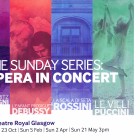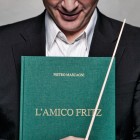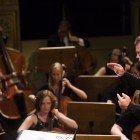Amico Fritz 2016Scottish Opera
Read more about the opera Amico Fritz
L'amico Fritz is one of a group of verismo period operas - not just by Puccini, Leoncavallo and Mascagni, but also Cilea, Catalani, Giordano, Montemezzi and Zandonai - that have been revived in recent years and found to hold the stage well. In Scotland this trend has largely passed us by, but Stuart Stratford has been closely associated with it elsewhere, and if Mascagni's L'amico Fritz, which he conducted in concert form on Sunday, is in any way representative, then we have a great deal of pleasure to look forward to in discovering more of these works.
The opera was put across with such a wonderful sense of conviction by all concerned that its neglect - not seen in Scotland since 1893 - is mysterious. One reason may simply be the plot, or rather its circumstances - set in Alsace, recently taken from France by Germany and soon to be taken back - with Christians, Jews and gypsies all living it seems in near-perfect harmony - it does, with hindsight, leave an uneasy feeling. However the orchestral performance was sweet-toned and lyrical from the very start of the prelude, and after the interval, with a superb intermezzo, the third act took on a surprisingly red-blooded aspect, meticulously controlled by the conductor. He had clearly convinced all the singers of the work's value, lucidly explained in his spoken introduction - there were no music stands in sight and even the chorus sang from memory.
The soloists were uniformly excellent. Peter Auty returned to the company after a ten-year gap. Natalya Romaniw made an excellent impression in a rather different part recently, as the Foreign Princess in Rusalka. They each have a show-stopping aria, and there are two remarkably individual duets. The Cherry Duet is justly famous, the only vocal piece from the opera to have independent life. However their third act climax was even better, with both voices soaring beautifully.
Stephen Gadd appeared in Scotland frequently at the start of his career, back in the nineties, but he has not worked here for a long time, and it was good to hear his warm baritone again, entirely appropriate for the sympathetic character of the rabbi. The part of Beppe, the young gipsy boy, also has some important solo work, and Hanna Hipp's rich mezzo created an interestingly three-dimensional character. The other roles were well taken by Donald Maxwell, Paul Curievici and Hazel McBain.
There are three more of these rareties scheduled for performance next year. They include Debussy's early cantata L'enfant prodigue (The Prodigal Son) which was eventually staged shortly before World War One - religious works including Samson and Delilah were subject to censorship until then. Rossini is represented by his delightful early farce The Silken Ladder, known for its famous overture. This is the only one of the four the company has tackled previously, though it was a long time ago. The final work is a real rarity, Puccini's first opera, Le villi, which has not been heard in Scotland before. This superbly enjoyable Mascagni piece really provides a challenge for them to live up to. And there are plenty by other composers for Stuart Stratford to show us in future seasons.
Read about the very first performances of L'amico Fritz in Scotland here.




